|
______________________________________________________
Another danger that
we face in today’s vehicle fires is the
Compressed Gas Strut
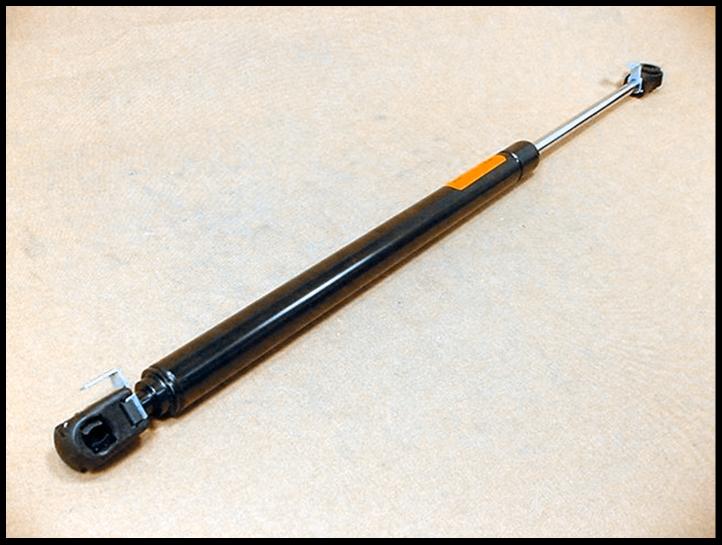
Most of us call them hood struts, thinking that they are used
to hold the hood up. This is true, but they are also used on:
- Trunk lids
- Hatch backs
- Tail gate glasses
- Pick-up toppers
- Tool boxes
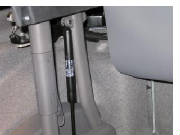
|
| Click picture to enlarge |
Today; we are even finding them inside the vehicle.
These are now being used to tilt the seats forward in many cars such as the C70 Volvo shown here.
Many SUVs are using them on their thrid row seats.
These Struts are felled with Compressed Nitrogen Gas. Like
the Argon we see in the airbag canisters, Nitrogen is non flammable and non explosive, but it has a very high rate of expansion
when exposed to very little heat.
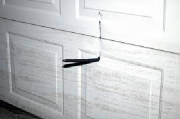
|
| Click picture to enlarge |
As the nitrogen expands the cylinder will many time blow the
shaft out like an arrow. Hundreds of been reported as being found as high as 270 feet from the vehicle, stuck in something.
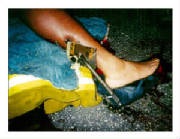
|
| Click picture to enlarge |
Many have actually pierced firefighters hands, legs and neck.
 . .
Hello Lee.
If your looking for a good story on struts
I have one for ya! First hand.
September 1999. I was working at the volunteer station along with one other
firefighter.
We were in the midst of having an addition built for our new
police-fire complex. It was lunchtime & the roofers were
just finishing up
before lunch when one of them noticed that a 1997 Pontiac transport was now
on fire in the parking
lot adjacent to the fire station. We pulled the
pumper truck out. I was fully dressed & had just stretched a handline
to
about 35 feet of the vehicle, approaching at a 90 degree angle from the
driver side because the car was parallel
to the street. As I bent down to
put my face mask on I heard a loud POP & felt something strike me in the
neck area.
I was knocked unconscious & woke up across the street with a
police officer attending to me telling me "don’t
move Mike". I him talking
to his partner saying I had something jammed in my neck & he had that "oh
****" look on
his face. I was rushed to the nearest trauma center where X
Rays & scans were done on my neck area. The Dr. Told me
I was a walking
miracle. My jugular was narrowly missed by 2mm (1/8").
What occurred is the rear struts for the rear
door of the 1997 Pontiac
Transport ruptured & exploded & was propelled through the sidewall of the truck
&
struck me in the neck.
I have pictures of the strut & my face after the accident. I will forward
them to you once
I did them out of their box.
Others many times will blow the cylinder end out
in much the same way.
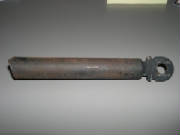
|
| Click picture to enlarge |
Hi Lee,
This is the hydraulic arm that holds the hood up. The hood was
already up on arrival the main body of fire was in the engine compartment, but spreading to the passenger compartment. The
arm blew up just as we were charging our handline. It gave us all quite a shock. Luckily no one was hurt. We put the fire
out from a distance and only approached the vehicle after everything was cooled to mop up and overhaul.
The
jagged end in the picture used to contain the piston. It was last seen flying over the electric lines. We never
found it.
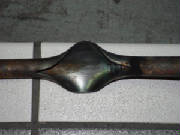
|
| Click picture to enlarge |
On a good day: Some will
only rupture the side of the cylinder.
These are very violent explosions, and have no pattern of results.
As we seen; some will shoot the shaft end out like an arrow, others will shoot the cylinder end out, and some will just
blow the side out of the cylinder.
They also have no pattern of travel; some have
been known to exit the vehicle straight forward and some at a 45 degree angle to the vehicle. Most of the reports read a lot
alike: “We seen it going over the power lines and found it many feet down the road stuck in something.”
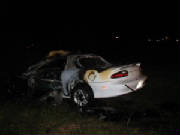
|
| Click picture to enlarge |
One picture, sent to me from Florida, shows just how violent
and unpredictable these can be. The shaft from the left side of the hood is shown stuck in the rear rubber bumper of the same
car that it came off of, after bouncing off other objects.
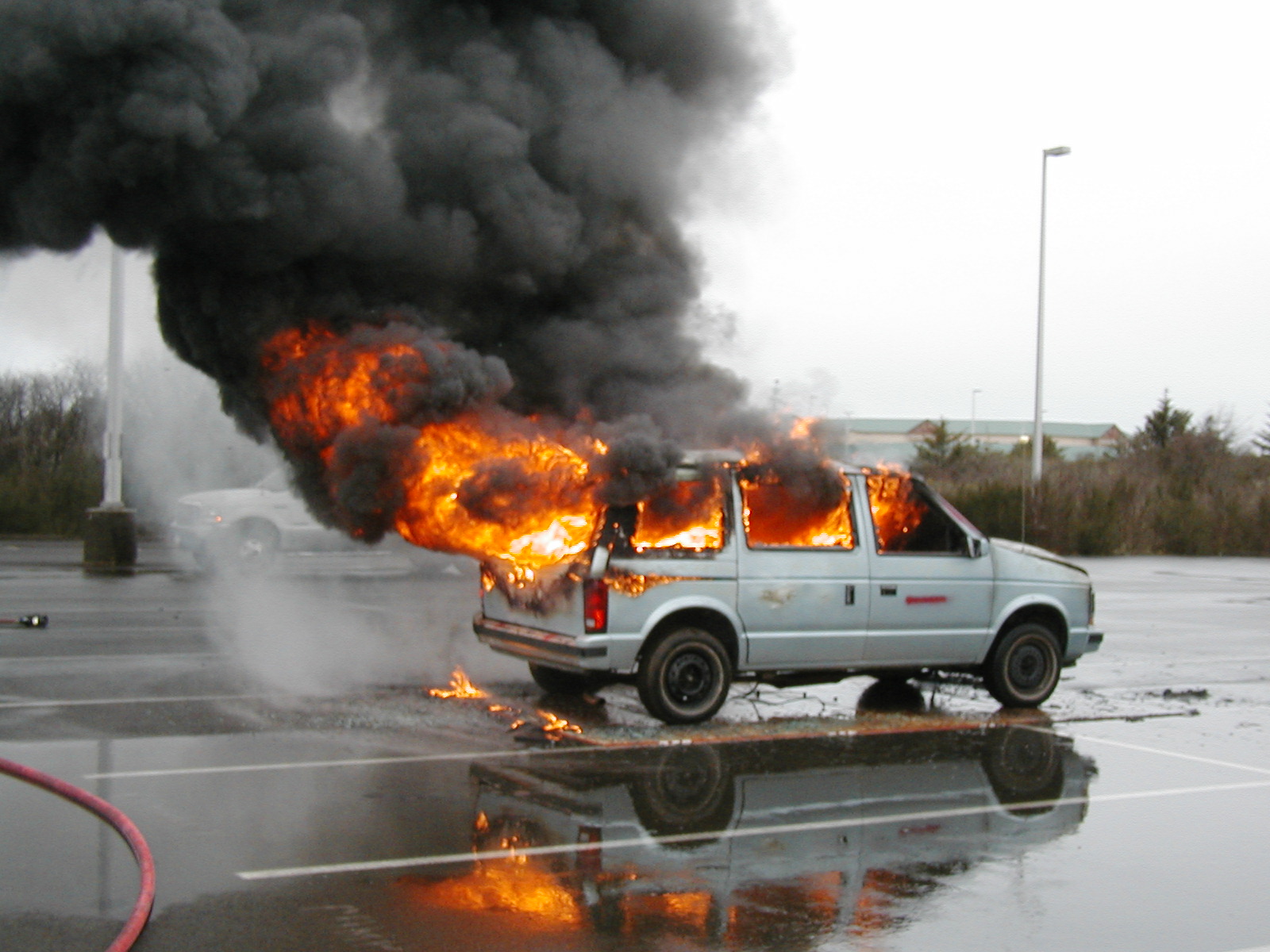
|
| Click picture to enlarge |
A personal experience gives us an idea of the force
of these explosions. I was teaching this class in Aberdeen, WA. last February. One of the vehicles we burnt was a 1989 Dodge
Caravan. Finding that it had these struts, on the rear full size door, we found a safe place to stand and started a compartment
fire in the van. Before the van had even begun to be fully involved, the right strut violently exploded. A few minutes later
the left one exploded, but not quit as violently. Upon investigating we found that the right strut had ejected the cylinder
end, it exited out at a 45 degree angle to the vehicle. In doing this it bent the door outward 8 inches. This portion of the
door is a round tube shape, with three layers of metal. The cylinder was found 44 feet across the parking lot.
As more and more of these reports began to come
in, I tried to find any pattern or similarity that would let us know what to expect or look for. There was no pattern; there
was one thing that did stand out though. It seemed that there were many more F-150 Ford pick-ups listed than any of the other
vehicles. My question was Why?
We went to the wrecking yard and burnt three F-150s,
starting each fire in a different location in the engine compartment, all three vehicles had the same two results. The ball
and socket that mounts the strut to the hood and fender are made of nylon. These melted very quickly leaving the strut lying
loose under the hood. Also the F-150 hood is made of very thin aluminum that lasted an average of 4 minutes, before melting
away, leaving the hot loose struts wide open.
One thing we have determined is that when these
explode, they will follow the path of least resistance. Using the hood as an example; when the strut explodes physics tells
us that for every action there is an equal and opposite reaction. Like a rifle the recoil of the cylinder is pushed into the
metal firewall area, which is much stronger than the metal fender that the shaft is mounted to, therefore the less resistance
is either straight forward or if it blows apart in the middle the weakest end will break loose and still having a forward
and upward motion it will exit diagonally. The same principle is true with the trunk lid or hatchback door.
Today; most
of us are still teaching the approach to a burning car that was developed in the early 1970s to avoid bumper struts. This
method actually teaches us to approach the vehicle diagonally to the corner of the car. Reality is: Today this actually
teaches the firefighter that he is supposed to be in the path of these exploding struts.
Is it time to change
our training Yet?
 . .
Nov. 21, 2004
Pictured above:
Drew Hill a Windsor Locks, CT firefighter was injured by an exploding gas hood strut while fighting a vehicle fire. Drew was attempting to open the hood, when the passenger side hood strut exploded and fired through his bunker pants, boot and lower leg.
_____________________________________________________________________
Sacramento, CA, Metro Firefighter Chris
Marsh.
“I moved to the passenger side of the vehicle
and started to extinguish the fire through the front grill when all of a sudden, we heard a large explosion,” said Marsh,
explaining about a gas strut exploding under the hood of the vehicle.
The cylinder end of the strut shot out through the
engine compartment and grille and pierced Marsh’s bunker gear and upper leg. The strut was so hot it actually cauterized
his wound as it pasted through. Just missing his femur, it exited through the back of his leg and was found 50 feet down the road.
___________________________________________________________________
Nov. 4, 2005 Las Vegus FD had a SUV fire, Both rear hatch struts blew.They both
shot out at a 45 degree angle,
___________________________________________________________________
Tn. We also had a gas strut blow on us a couple of weeks ago. Luckily no one was hurt.
One end of it was last seen flying over the power lines 20 feet overhead.
I was able to keep the lower end of the strut
that stayed attached to the car. I will post pics in a few days.
___________________________________________________________________
Albrta Can. We have had numerous hood struts go through the hood of Fords in the
last couple of years, gives you a whole new respect for hydraulics under heat pressure
___________________________________________________________________
Had a couple incidents of gas cylinders exploding. One was on the hood of a vehicle. The other was
on a rear hatch window. Wish I could remember the makes and models. It was too long ago. I try to pay attention to positioning
as it relates to these things rocketing off.
_____________________________________________________________________
A Ks. firefighter had one come through the head light and went through his glove and
hand.

|

